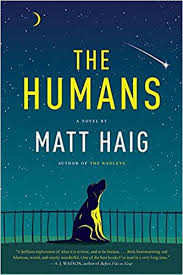The Humans, Matt Haig, UK, 2013
 ‘… it takes time to understand humans because they don’t understand themselves. They have been wearing clothes for so long. Metaphorical clothes. (…) That was the price of human civilisation – to create it they had to close the door on their true selves.’ (Page 130).
‘… it takes time to understand humans because they don’t understand themselves. They have been wearing clothes for so long. Metaphorical clothes. (…) That was the price of human civilisation – to create it they had to close the door on their true selves.’ (Page 130).
The ‘I’ of the book is an alien. He looks like Professor Andrew Martin from Cambridge University, (who, we are told, is dead), but he thinks like an alien, a Vonnadorian, and comes from a place so far away that it is impossible for our simple Earth minds to visualize the distance.
Professor Andrew Martin has just solved one of mathematics’ greatest riddles, the Riemann hypothesis, and the Vonnadorians have sent someone not only to delete all of the professor’s work, regarding the hypothesis, but also to eliminate anyone and everyone who may have been given any inkling that there could be a solution. The solution would allow Earth to evolve from a primitive planet to a planet of high technology, something the Vonnadorians do not want to happen.

Initially, the clone of Andrew Martin has no qualms about destroying the professor’s work, nor does he seem perturbed by having a job description that states that the professor’s family – wife Isobel and son Gulliver and, possibly, the dog Newton – will all have to die. But, as he begins to understand what a human really is, and as he begins to appreciate music, poetry, peanut butter sandwiches and the kindness people show each other, he has second thoughts.
This is a beautiful description of what it is to be human. On one level it is a comedy, rollicking through realms of science fiction and fantasy; on another level it is a serious look at all the things that make us human. The Vonnadorians may have eternal life. They may have conquered illness and pain; they may have mastered travel techniques light years beyond our own; they may have a complete understanding of higher mathematics; but their life, if we are to believe the professor’s clone, is, when compared with life on Earth, totally boring.

The clone has never been part of a family. He has never experienced someone doing things for him just because that is what they want to do. As he is pulled into a sense of family by Isobel’s concern for him and by Gulliver’s need for him and, possibly, by Newton’s understanding of him, he realizes that being human is not as negative and/or primitive as he has been led to believe.
In his advice to Gulliver, he says: ‘Don’t worry about your abilities. You have the ability to love. That is enough.’ It is this understanding that is at the centre of this remarkable book.